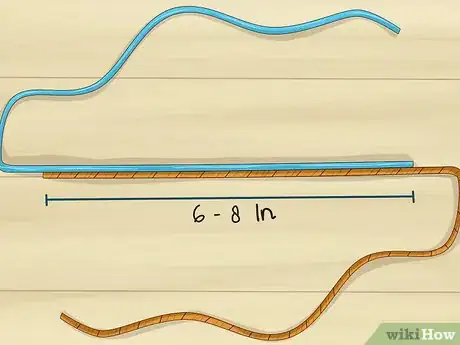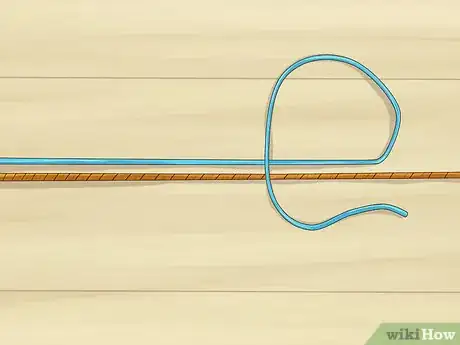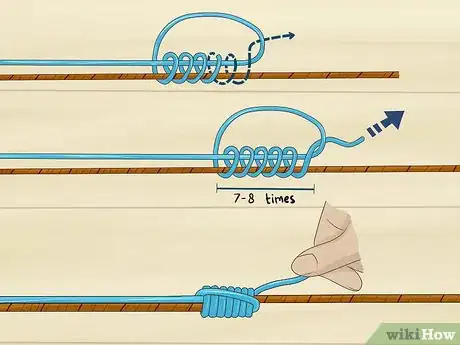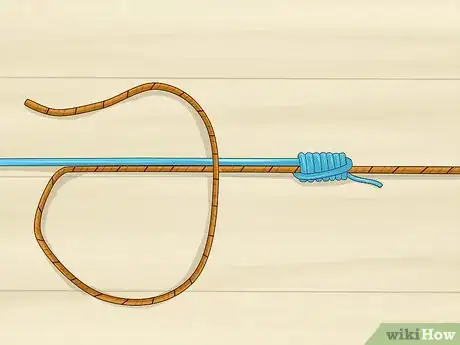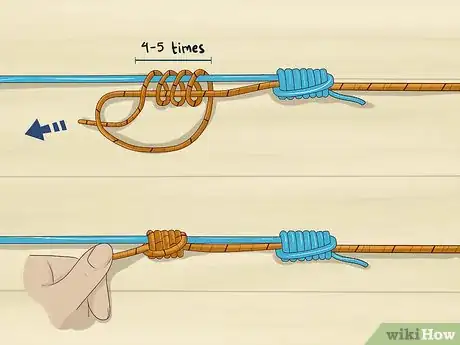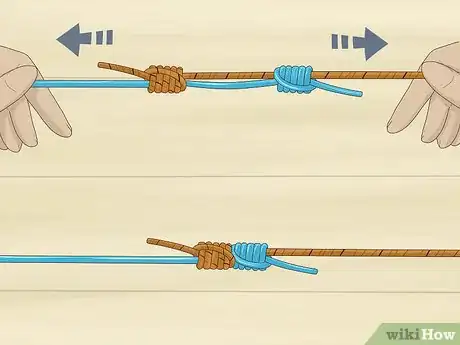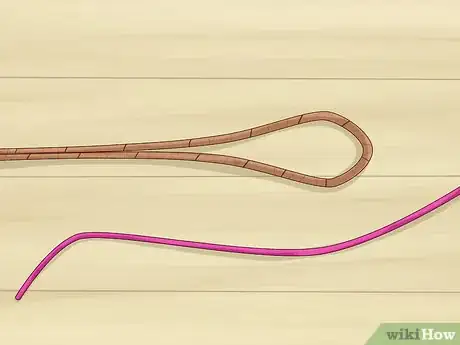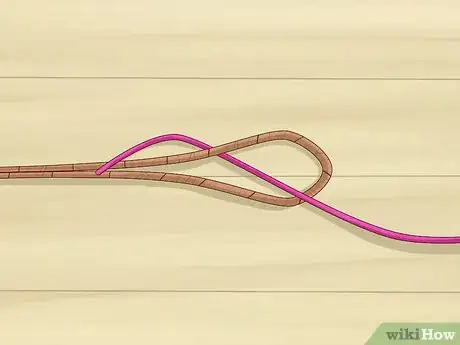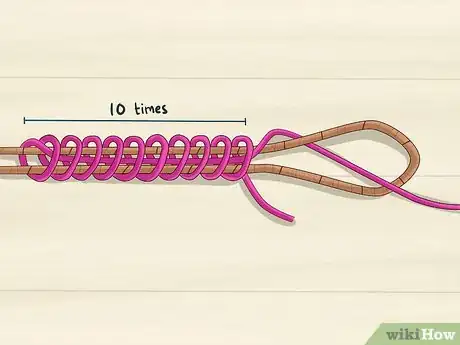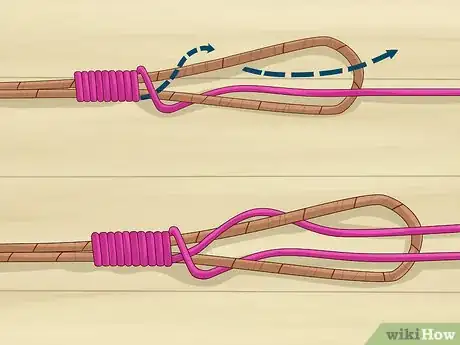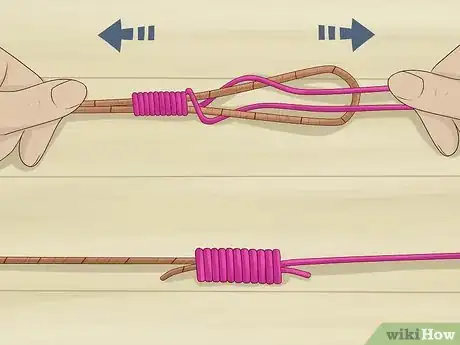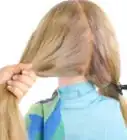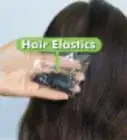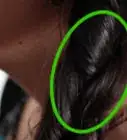This article was co-authored by wikiHow Staff. Our trained team of editors and researchers validate articles for accuracy and comprehensiveness. wikiHow's Content Management Team carefully monitors the work from our editorial staff to ensure that each article is backed by trusted research and meets our high quality standards.
This article has been viewed 90,485 times.
Learn more...
When you want to tie braided fishing line to monofilament line, such as when you are connecting a mono leader to a braided main line, the best knot to use is a double uni knot. This knot is simple, fast to tie, and very strong. That being said, there are other ways to tie 2 lines of different diameters together that you may want to use in specific scenarios. For example, the Albright knot is popular when tying fly line to backing line for fly fishing because it slides easily through your reel guides.
Steps
Tying a Double Uni Knot
-
1Lay the 2 lines parallel, overlapping the ends by about 6–8 in (15–20 cm). Lay the monofilament line on top and the braided line on the bottom so they run parallel in opposite directions. Overlap the ends by at least 6–8 in (15–20 cm) to give yourself plenty of line to work with.[1]
- The double uni knot is the simplest and fastest way to tie a braided line to a monofilament line. It’s also one of the most reliable knots you can use to join any 2 lines together.
Tip: This is the main knot you want to use to tie a braided line to a monofilament line. It will be sufficiently strong in 90% of fishing scenarios.
-
2Create a loop about the size of your fist with the mono line. Loop the overlapped end of the monofilament line down and back over itself. Pull the end up and lay it across the parallel braided line.[2]
- It’s easiest to practice tying the knot with the lines lying on a table or other flat work surface.
Advertisement -
3Wrap the end of the mono line loop 7-8 times around the parallel lines. Grab the end of the loop you just made and wrap it around both lines through the center of the loop. Pull the end of the mono line out of the loop after you wrap the lines 7-8 times so it is pointing the original direction it was going in before you created the loop.[3]
- Make sure you have enough line to pull on after wrapping it 7-8 times. If there isn’t enough slack, then start again with a bigger loop.
-
4Make a loop with the braided line. Double the end of the braided line up and back over itself. Pull the end down across the parallel mono line.[4]
- Make sure you have left enough at the end of the loop to wrap it around the 2 parallel lines.
-
5Wrap the end of the braided line loop 4-5 times around both lines. Take the end of the loop you made with the braided line and wrap it around both lines through the center of the loop. Pull the end of the braided line out of the loop in the original direction it was facing after 4-5 wraps.[5]
- If there isn’t enough line at the end of the loop to wrap it 4-5 times, then start over with a bigger loop. You can always cut off excess line later if you make it too big.
-
6Pull both ends of the lines apart to tighten the knot. Grab both sides of the joined lines, 1 in each hand, and pull them slowly in opposite directions to cinch the knots closed. You will now have 2 uni knots right next to each other connecting the braided and mono lines tightly, hence the name double uni knot.[6]
- The double uni knot is about 90% sure to hold when tied properly.
Using an Albright Knot
-
1Make a loop at the end of the braided line. Double the braided line back over itself to create a loop. Make the loop at least 2–3 in (5.1–7.6 cm) long so you have plenty to work with.[7]
- The albright knot is an alternative knot you can use to tie a braided line to a monofilament line. You can use it to tie any lines of 2 different diameters together.
Tip: This knot is a good choice to tie a fly line to the backing line for fly fishing because it slides easily through the guides of your reel if a fish pulls out enough line to reach the backing.
-
2Slide the end of the mono line under and up through the loop. Grab the end of the mono line and pull it through the loop of the braided line. Pull enough through so that you will be able to wrap it 10 times.[8]
- Always make the loop with the thicker line and use the thinner line for wrapping.
-
3Wrap the mono line 10 times around itself and the loop. Pass the end of the mono line under the loop. Wrap it around the looped braided line and itself, passing it under and around all 3 lines every time, until you have made 10 complete wraps.[9]
- If you don’t have enough line to wrap it 10 times, then start again and pull more of the mono line up through the loop this time.
-
4Slide the end of the mono line back down through the loop. Push the tip of the mono line back down through the loop next to itself. Pull through the other side so you can grab both parallel sides of the line together.[10]
- You will now have joined the mono and braided lines and all that’s left to do is tighten them.
-
5Pull both ends of the lines to tighten the knot. Grab the braided line in 1 hand and the mono line in the other. Slowly pull them apart to cinch the knot all the way tight.[11]
- Your 2 lines are now securely joined and you can trim off any excess line at the ends.
Things You’ll Need
- Braided line
- Monofilament line
- Line cutters or scissors
References
- ↑ https://www.youtube.com/watch?v=5YENkaaXo_U&feature=youtu.be&t=44
- ↑ https://www.youtube.com/watch?v=5YENkaaXo_U&feature=youtu.be&t=52
- ↑ https://www.youtube.com/watch?v=5YENkaaXo_U&feature=youtu.be&t=78
- ↑ https://www.reelfishingadventures.net/Extra%20Pages/braided_lines.html
- ↑ https://www.reelfishingadventures.net/Extra%20Pages/braided_lines.html
- ↑ https://www.youtube.com/watch?v=5YENkaaXo_U&feature=youtu.be&t=90
- ↑ https://www.animatedknots.com/albright-knot
- ↑ https://www.animatedknots.com/albright-knot
- ↑ https://www.animatedknots.com/albright-knot
